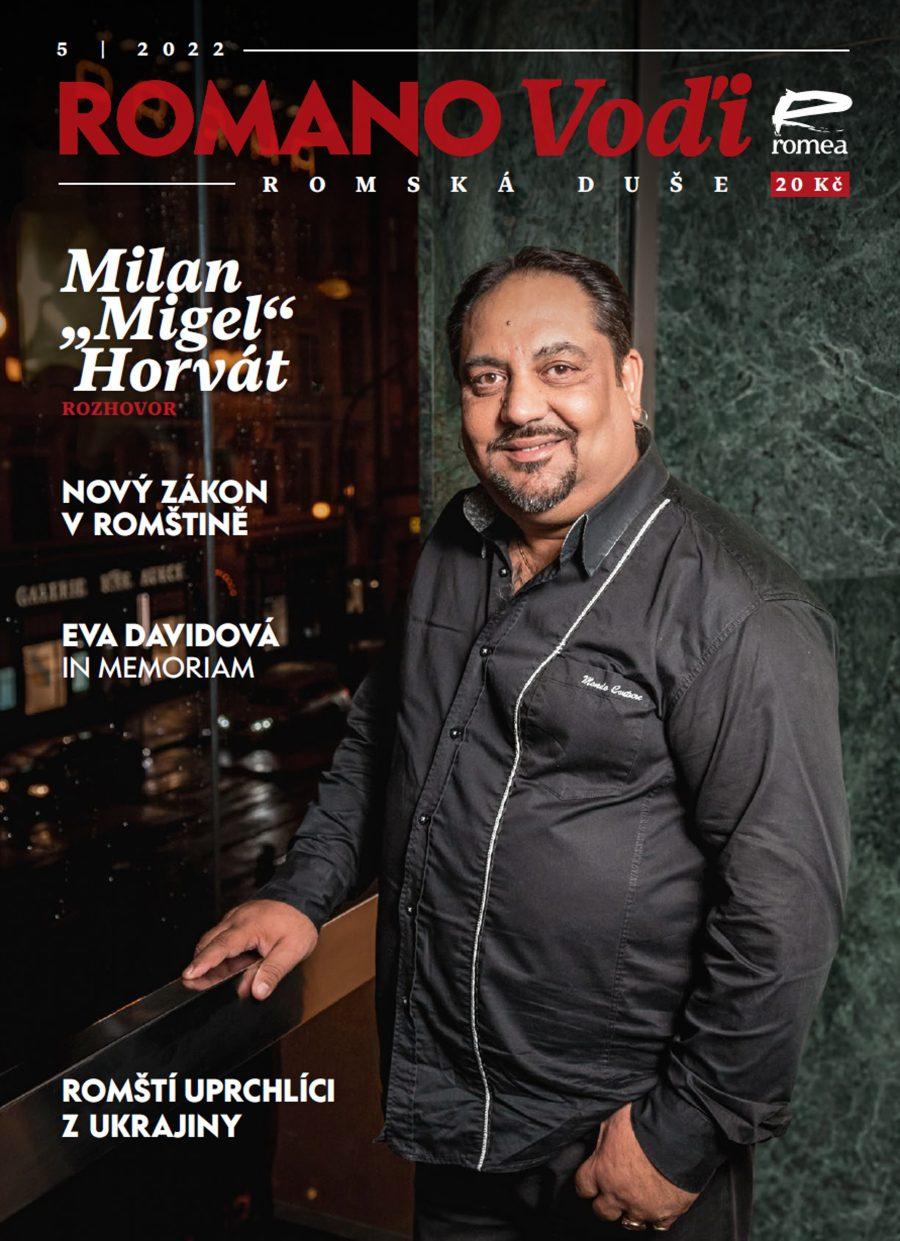If the food and the fuel runs out, winter could see another wave of Romani refugees from Ukraine
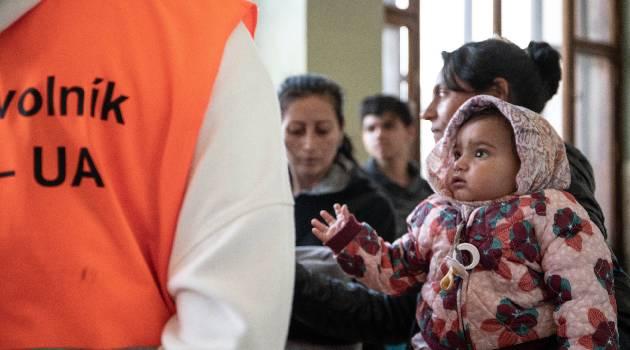
Before the Russian Federation began its full-scale invasion of Ukraine, Oksana Lokotosh had a satisfactory life in a two-storey house in Donbas with one of her daughters and her six grandchildren. The women grew fruits and vegetables and raised hens and pigs in a spacious garden.
The family sold whatever they did not consume themselves. When the Army of the Russian Federation chose their home as a target, their lives were turned upside down.
“Fortunately, I was in the hospital at the time and my daughter and her children were shopping. When they returned home, the house had been bombed,” says the 64-year-old Lokotosh.
“We took just the most essential things and left,” she recalls. Their travels brought them to Prague, then to a collection camp in South Bohemia, and ultimately to a residential hotel in the Karlovy Vary Region in the town of Luby, which is run by the Khamoro Chodov nonprofit organization.
The media is no longer covering the story
At the residential hotel in Luby, a small town with roughly 2,000 inhabitants that is famous for its stringed instrument production, the Lokotosh family now lives with other Romani refugees from Ukraine. Currently the entire group consists of five adults and 19 children.
In the spring that number was even higher and there were 34 Romani people altogether being housed in Luby. According to Emil Voráč, director of Khamoro Chodov, many of the Romani Ukrainians who fled to the Czech Republic are no longer there.
“Roughly half returned to Ukraine, and half of the remaining half continued on to Western Europe, for example, to Germany, Ireland or Norway,” he explains. His organization has aided about 300 Romani Ukrainians since 24 February.
Voráč is convinced that many Romani Ukrainians were forced to leave the Czech Republic. “There was and there still is a lack of will from the side of the institutions here. Currently the media is not reporting on the Romani Ukrainians, but their situation remains the same,” he describes.
“For example, in Luby the mayor told us not to count on his cooperation. He has also been influencing local entrepreneurs such that it has been impossible for the refugees to find jobs in town. Health care facilities refuse the Romani Ukrainians and so does the local school. The responsiveness depends on local councillors and here, everybody we reached out to spoke the mayor’s languages. In Cheb, on the other hand, there was no problem,” Voráč says.
This means 10 Romani Ukrainian schoolchildren living in Luby must commute 35 kilometers daily to Cheb to attend school. They get up at 4 AM to catch the train at 5 AM and get to school on time.
David Grunza, who works at the residential hotel in Luby for Khamoro Chodov as the manager, commutes with the schoolchildren every morning to the school and brings them back in the afternoon. As he says, the commuting is not just costly in terms of time, but also financially; the organization is spending on a monthly basis approximately CZK 23,000 [EUR 950] on transportation alone.
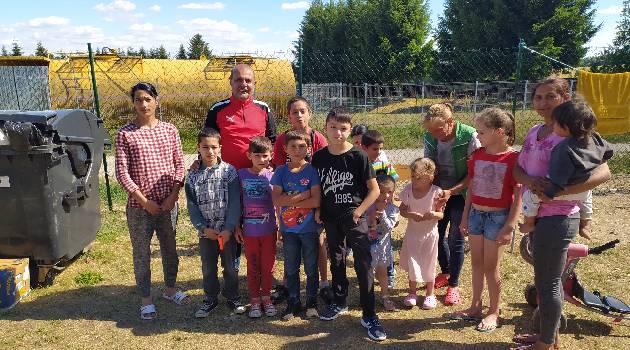
Misconduct at Prague’s Assistance Center for Aid to Ukraine
According to Czech Government Human Rights Commissioner Klára Šimáčková Laurenčíková, Romani refugees from Ukraine have the same rights as all other refugees. “It is unfortunately true, though, that some Romani refugees have been discriminated against, as has been documented by the conclusions of the Public Defender of Rights,” she told Romano vodi magazine.
An investigation by the Office of the Public Defender of Rights into several of the Regional Assistance Centers for Aid to Ukraine (KACPU) in the Czech Republic, discrimination against Romani refugees happened at the Prague center in mid-May. Unlike non-Romani Ukrainian refugees, the Romani refugees were only allowed inside the registration center if accompanied by nonprofit sector staff or police.
Unlike non-Romani Ukrainian refugees, Romani ones were also required to have their accommodation arranged before they could apply for temporary protection. Later the situace improved, according to Laurenčíková, but discrimination against Romani Ukrainians continues, both from the side of authorities and from Czech residents – who otherwise, especially in the immediate aftermath of the full-scale invasion on 24 February, have done their best to aid refugees from Ukraine with all kinds of things.
The reason for this, according to the Human Rights Commissioner, is the bias against Romani people that is deeply-rooted in Czech society. “This is reflected in their situations, especially in the areas of housing, social security, health care and the education of Romani children in the schools,” she says.
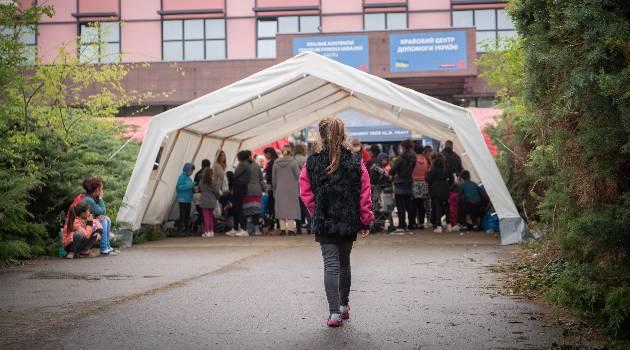
Go west
Miroslav Brož, an activist from the Ústecký Region who established the Konexe association there is very well aware of Czech society’s negative attitudes toward Romani people. For that reason, as he says, he had no expectations of their receiving aid here and instead he has been assisting them with their onward journeys to Western Europe since 24 February.
“From the very beginning we were able to guess what would happen, that the Roma would not be dealt with the same way the non-Romani refugees from Ukraine were dealt with,” Brož explains. He was already contacting nonprofit organizations abroad on behalf of Romani Ukrainians by the close of February.
“I wrote to institutions in Germany and asked whether they would be willing to pick up about 10 people at the train station and aid them. Then the ‘scandal’ of vetting Romani refugees for their possible dual Hungarian-Ukrainian citizenship happened and we began to send many more of them westward. They didn’t just take care of that first little group in Germany, they took care of the crush of people that literally did not let up for three months,” he explains.
The exact number of how many Romani Ukrainians he aided with going west was not tracked by Brož, but when there was a moment to take stock, he was startled at how high the number most likely is. “I helped get a minimum of 700 people to Germany, 100 to Ireland and dozens to Oslo,” he says.
Brož describes two differing approaches being taken toward Romani Ukrainian refugees – the Czech approach and the German one: “To compare, in the Czech Republic Romani Ukrainian refugees disembark from a train, wait 12 hours in front of a center for registration, and then are vetted as to whether they have dual citizenship. That lasts up to nine days, and in the interim they sleep at the train station. If the authorities discover they are dual citizens, the refugees receive no support. If the authorities discover they are only Ukrainian citizens, they take the Romani Ukrainian families to detention centers or refugee tent camps set up outside.”
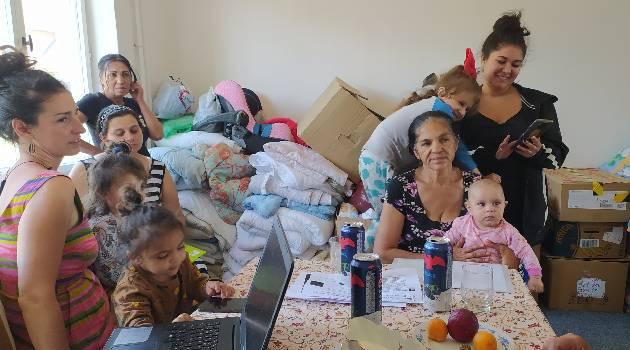
Photo: Emil Voráč
“Detention centers are essentially remand prisons in the middle of nowhere, surrounded by barbed wire, where there are cells instead of rooms,” he describes. He also encountered instances in which the Romani Ukrainian refugees refused to leave the bus once they saw the centers – which the authorities assessed as their having “refused” the aid being provided.
“In Germany, on the other hand, when the Romani Ukrainian refugees get off the train they will be accommodated in a hotel if they arrive in the evening. They get food, something to drink, medical treatment if necessary. Registration at the asylum center happens the next day. Nobody there is interested in whether they might have dual citizenship. Authorities just investigate whether the refugees actually lived in Ukraine, and that same day they go to a residential hotel for refugees that is really very nicely furnished. They stay there four to six weeks and then get a social apartment,” he says.
“The only thing they want from the refugees in Germany is that they learn to speak German, which is absolutely comprehensible. Moreover, they provide German language courses free of charge. Children also have to go to school. In the Czech Republic, nobody cares about any of that,” Brož says.
This is not the case everywhere in Germany, though. “I know, for example, that in Bavaria there are problems, it has quite a strong antigypsyist tradition there, just like the Czech Republic. We did not recommend Romani Ukrainian refugees go there. We directed most of them to Bremen, Hamburg or Saxony,” he says.
Immediately after 24 February, he contacted the volunteer initiative at Prague’s main railway station and commuted there daily from his home in Ústí nad Labem. Frequently he provided aid to the refugees there until midnight.
“I was also communicating with a Romani parson on the Slovak-Ukrainian border who has a small church there where he is aiding Romani Ukrainian refugees. Dozens of people whom he recommended to me I then helped get to Norway. In addition, we have a partner organization in Dublin whom we also involved. We bought 80 plane tickets and helped people get there,” he says.
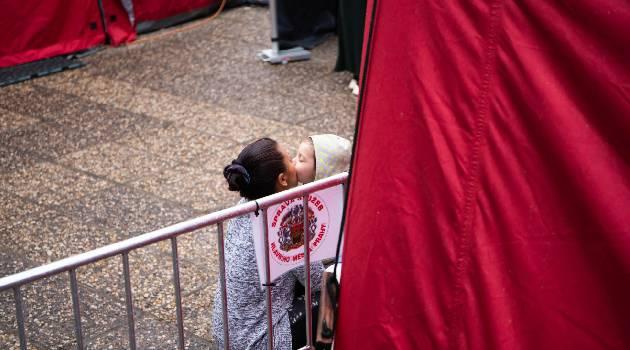
Dual citizenship?
The “scandal” of dual citizenship contributed to a great extent to the not exactly ardent approach towards Romani Ukrainian refugees. It turned out to be an exaggerated bubble that soon burst.
“Most Romani refugees genuinely had Ukrainian citizenship,” says the Czech Government Human Rights Commissioner, pointing to a PAQ Research project into Romani Ukrainians in the Czech Republic that found 99 % of a 100-household sample were Ukrainian citizens only.
The Czech Police also did not substantiate the claim that “many” Romani refugees held both Hungarian and Ukrainian citizenship, as the Czech media and some politicians abundantly and erroneously asserted. “As of now we have asked for approximately 5,500 cases to be vetted and as a result we found about 150 persons who genuinely have dual citizenship,” Police Presidium spokesperson Ondřej Moravčík said about an investigation conducted in June.
Once winter comes
The substandard conditions in the detention centers have also been confirmed by the director of the Life Together nonprofit, Kumar Vishwanathan. “That was demotivating. In the detention center in Vyšní Lhota there were mostly children and women who were absolutely isolated there. We kept bringing the children footballs because if they kicked a ball over the barbed wire they were unable to retrieve it,” he describes.
According to Vishwanathan there were about 2,000 to 3,000 Romani Ukrainians in the Ostrava area during the spring. “They were living mainly at the train stations or in the detention center in Vyšní Lhota, but the Government closed it at the end of June. I just know of four families who have remained in the Czech Republic. The rest went to Germany or returned to Ukraine,” Vishwanathan says.
According to Milada Hošková of the volunteer initiative at the main railway station in Prague, Romani Ukrainian refugees do still sometimes come to the Czech Republic, but by no means to the same extent as they were in the spring, and most of them are in transit to other countries in Western Europe. Karel Karika, a Romani activist who is also a city councillor in Ústí nad Labem, says that currently new refugees are not arriving – rather the existing refugees are migrating from region to region.
Brož expects another onslaught this winter due to the destroyed infrastructure in Ukraine, which has been shelled by Russian troops, as a consequence of which many people have neither electricity, heat or water. Jan Husák of the Romodrom organization views the situation similarly; in addition to aiding the Romani refugees in the Czech Republic, the organization is doing its best to assist Romani people directly in Ukraine itself.
“They are most concerned that there will not be enough food and firewood, because they are no longer able to go into the forest for wood or kindling. The Zakarpattia Oblast is the only forested region in Ukraine, so if the crisis scenario happens, it is most likely there will be a radical tightening of the terms under which timber can be harvested or collected,” Husák said in an interview for Romea.cz
According to the PAQ research agency, in July there was a total of 41 % of Romani Ukrainian refugees living in the Czech Republic who had decided to return to Ukraine. Some wanted to keep going west.
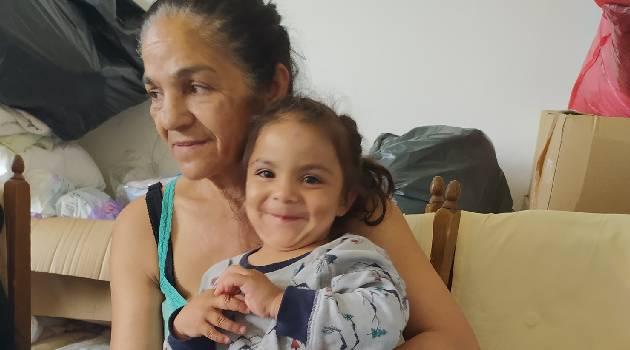
Oksana Lokotosh is among those who have decided to remain. She says she does not feel discriminated against by ordinary people in the Czech Republic.
Lokotosh points from the residential hotel window at the house across the way with its landscaped garden. “Our neighbor brings us fruit and vegetables for the children. She is very nice,” she says, smiling.
She is holding her eight-month-old grandson from her second daughter on her lap – that daughter has not yet made it to the Czech Republic. Lokotosh hopes she will make the journey soon.
Fleeing Ukraine is not the first big barrier she has had to face in her life. It was difficult when, at less than 30 years of age, she was widowed and had to take care of her eight children herself.
Currently she is proud of her big family. She has 24 grandchildren altogether.
Lakotosh would be quite glad if her other daughters brought their children to be with her in the Czech Republic where it is safe, but she respects their decisions to remain in Ukraine. “My children already have their own families and it is up to them whether to come here or remain in Ukraine. My two sons and sons-in-law are unable to leave the country though, they are fighting for our homeland,” she says.
When asked whether she doesn’t want to go back home after the war, she sadly shakes her head. “I do not have anywhere to return to, there is no roof over my head there anymore.”
First published in Czech in Romano voďi magazine www.romanovodi.cz.
